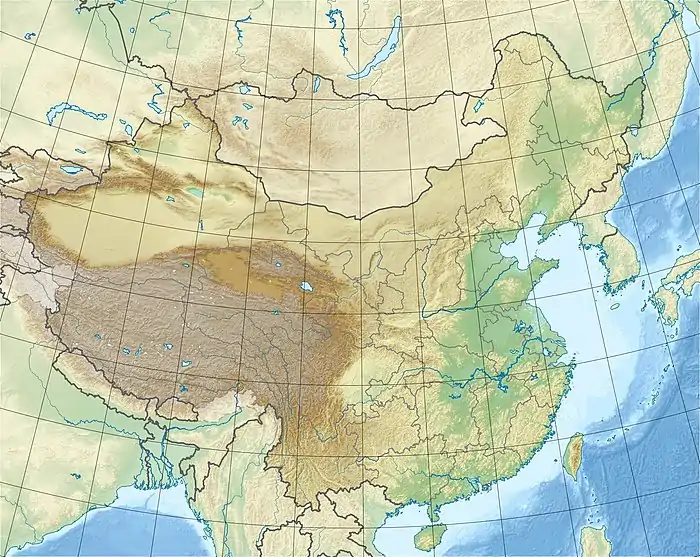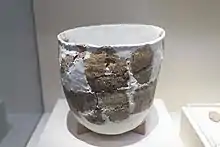 | |
 Location in China | |
| Location | Jiangxi |
|---|---|
| Region | Southern China |
| Coordinates | 29°33′56″N 115°57′31″E / 29.56556°N 115.95861°E |
| History | |
| Material | Limestone Karst |
| Founded | 20,000 BP |
| Abandoned | 17,800 BP |
| Periods | Paleolithic China |
The Xianren Cave (Chinese: 仙人洞, Xiānréndòng), together with the nearby Diaotonghuan (Chinese: 吊桶环, Diàotǒnghuán) rock shelter, is an archaeological site in Dayuan Township (大源乡), Wannian County in the Jiangxi province, China[1] and a location of historically important discoveries of prehistoric pottery shards and it bears evidence of early rice cultivation. The cave's name refers to the legendary Chinese enlightened people, the Xian "immortals". The cave is 7 m (23.0 ft) high, 11 m (36.1 ft) wide, and 14 m (45.9 ft) deep.
A 2012 publication in the Science journal, announced that the earliest pottery yet known anywhere in the world was found at this site dating by radiocarbon to between 20,000 and 19,000 years before present, at the end of the Last Glacial Period.[2][3] The carbon 14 datation was established by carefully dating surrounding sediments.[3] Many of the pottery fragments had scorch marks, suggesting that the pottery was used for cooking.[3]
These early pottery containers were made well before the invention of agriculture (dated to 10,000 to 8,000 BC), by mobile foragers who hunted and gathered their food during the Late Glacial Maximum.[3]
See also
.png.webp)
References
- ↑ "The unusual Xianren Cave (奇特的仙人洞)" (in Chinese). 31 August 2008. Archived from the original on 12 March 2017. Retrieved February 26, 2011.
- ↑ Stanglin, Douglas (2012-06-29). "Pottery found in China cave confirmed as world's oldest". USA Today.
- 1 2 3 4 5 Wu, X; Zhang, C; Goldberg, P; Cohen, D; Pan, Y; Arpin, T; Bar-Yosef, O (June 29, 2012). "Early Pottery at 20,000 Years Ago in Xianrendong Cave, China". Science. 336 (6089): 1696–1700. Bibcode:2012Sci...336.1696W. doi:10.1126/science.1218643. PMID 22745428. S2CID 37666548.
- ↑ Huan, Anthony (13 April 2019). "Ancient China: Neolithic". National Museum of China.


